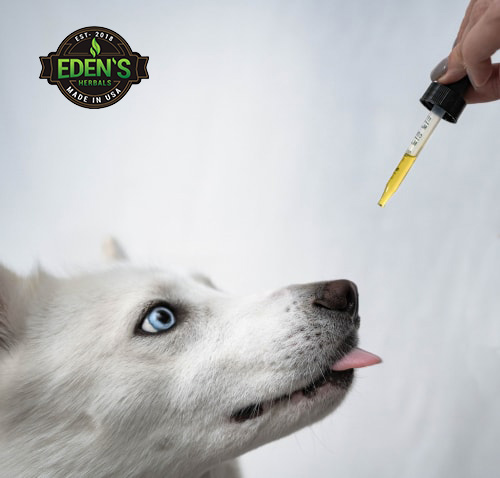 There is no shortage of evidence and interest in how CBD can help humans, and this area will clearly continue to expand as time goes on. But, can CBD help your pet as well?
There is no shortage of evidence and interest in how CBD can help humans, and this area will clearly continue to expand as time goes on. But, can CBD help your pet as well?
It seems that the answer may be yes.
What can CBD help with?
Anecdotal evidence is everywhere: CBD can potentially help with numerous pet concerns.
Backed up by numerous news reports and research articles, CBD presents a possible alternative for pets to deal with a variety of needs.
According to the American Kennel Club, CBD can be particularly useful in helping dogs. Broadly speaking, CBD is phenomenal for dogs but, as usual, more research is also needed.
Furthermore, the FDA has not formally approved any CBD medication for pets and animals. While this doesn't mean that CBD should be completely avoided, it does mean that there is a greater degree of research required by any responsible pet owner.
It's important to note that CBD is not the same as marijuana. Depending on the type, it contains no or trace amounts of THC. As such, you will not get your pet high by giving it to them.
 How does it work?
How does it work?
CBD in pets works the same as it does in humans. Just like humans, animals have an Endocannabinoid System, which regulates a variety of functions in pets, such as pain, mood, anxiety levels and more.
Thankfully, in most animals, it also has a lack of serious side effects. Possible side effects include dry mouth, drowsiness and lowering blood pressure, so use CBD with caution if you decide to do so, and be particularly cautious if your pet already has low blood pressure.
However, these side effects are relatively manageable. This means that, in many cases, you can give your pet CBD without risking getting them ill on the drug.
How to give your pet CBD safely
While CBD itself is highly unlikely to get your pet sick, it is important to note that other ingredients in the mixture may do so. For example, many veterinarians have treated animals who got into marijuana brownies - and it's the chocolate in those brownies which are more likely to get a pet sick than the marijuana itself!
 As any dog owner knows, chocolate can kill a dog in high amounts - thus, your safest bet is absolutely to avoid mixing chocolate and CBD. Make sure to check with your veterinarian before giving your dog any CBD product in order to make sure you aren't inadvertently giving them an ingredient which could endanger their health.
As any dog owner knows, chocolate can kill a dog in high amounts - thus, your safest bet is absolutely to avoid mixing chocolate and CBD. Make sure to check with your veterinarian before giving your dog any CBD product in order to make sure you aren't inadvertently giving them an ingredient which could endanger their health.
One of the greatest challenges when it comes to giving your pet CBD is the dosage. Too little, and there's no benefit. Too much, and you risk negative side effects.
Unfortunately, given the newness in the field, there is very little research available about the appropriate dosage for CBD in humans or pets. As such, your best bet is to talk with a veterinarian who has experience with CBD.
The good news is that this field is rapidly emerging, and additional research is likely to emerge soon. For example, the American Canine Health Foundation is currently conducting a study to determine the positive benefits of CBD.
The only FDA approved drug for CBD in humans is for certain types of seizure disorders in children, so it is highly possible that CBD can have the same effect in animals.
 How to start
How to start
Slow and steady, and talk to the experts.
While more research is needed, it does appear that CBD has potential benefits for pets. Like all drugs, they should be consumed with caution. So, three points going forward.
1. Talk with your veterinarian, or try to find a vet who is knowledgeable about CBD in animals. Given the relative newness of this field, this may be difficult.
However, at the very least, check with your vet to determine if the CBD product you are purchasing has any potential ingredients which may cause your pet problem. Interestingly, according to Consumer Reports, current restrictions on CBD stop a veterinarian from bringing up its use first, meaning that you, as the pet owner, will have to broach the topic.
This is the case for every state in the country except California, which has passed a law which allows CBD to be discussed by veterinarians.
2. Make sure the product you are purchasing has been independently tested.
Since CBD is so new, there is a real lack of consumer protections around the product. This has led to a variety of bad actors and sketchy companies taking advantage of people and selling mislabeled products. A recent Penn State study tested 81 CBD products and found that 70% of them were mislabeled.
This can be problematic in any human but can be deadly in pets, who can die from an overdose of relatively common ingredients. As such, make sure that the product you purchase has been independently tested by a third party, meaning that 3rd party has confirmed that the product is labeled accurately and has all the ingredients it says it does. This ensures that you are actually giving your pet the medicine that you purchased!.png) 3. Start slowly. Give your pet a relatively small dosage and see how they react. If they seem to be okay - or at least not experiencing any negative possible side effects - increase the dosage until you get to one where they seem to be experiencing some relief.
3. Start slowly. Give your pet a relatively small dosage and see how they react. If they seem to be okay - or at least not experiencing any negative possible side effects - increase the dosage until you get to one where they seem to be experiencing some relief.
CBD in pets, just like CBD in humans, seems to have real potential. Responsible use, combined with consulting with a medical professional, may be able to give your beloved pet true relief. Start slowly, and be responsible, but understand that CBD may truly help your pet.
*CBD has not been approved by the FDA to diagnose, treat or cure any illness. All of the articles on this site are written by 3rd party content providers, expert bloggers or Doctors not directly affiliated with Edens Herbals. Individuals should learn the risks and side effects prior to taking CBD. Make sure to always check with a medical professional before starting any new CBD treatment or medication.


